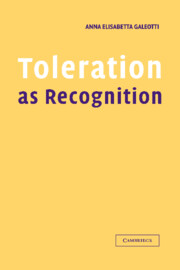Book contents
1 - Liberal theories of toleration
Published online by Cambridge University Press: 22 September 2009
Summary
THE CONCEPT OF TOLERATION
Toleration is the social virtue and the political principle that allows for the peaceful coexistence of individuals and groups who hold different views and practice different ways of life within the same society. This very general definition indicates that the conditions under which toleration is required are situations in which social differences exist which do not naturally coexist harmoniously; if they were to do so, there would be no need for any such principle. Potential or actual causes of conflict are required for toleration to be necessary in order to bring about social order and peace. As long as peace is a political value, toleration will be valued as well. However, toleration also exhibits a particularly problematic aspect: if its precondition is the presence of conflicting social differences, this implies that the bearers of such differences do not welcome what they see as being incompatible with their views and forms of life. In order to become tolerant they first need to dislike or disapprove of the different practices which are at odds with their own, and then to overcome such feelings, giving way to toleration. Yet this is puzzling: how can toleration be good if it involves putting up with what is disliked or disapproved of? In this light, toleration seems to be more a disposition that results from a compromise than one which could count as having positive ethical and political value in its own right.
- Type
- Chapter
- Information
- Toleration as Recognition , pp. 20 - 52Publisher: Cambridge University PressPrint publication year: 2002



